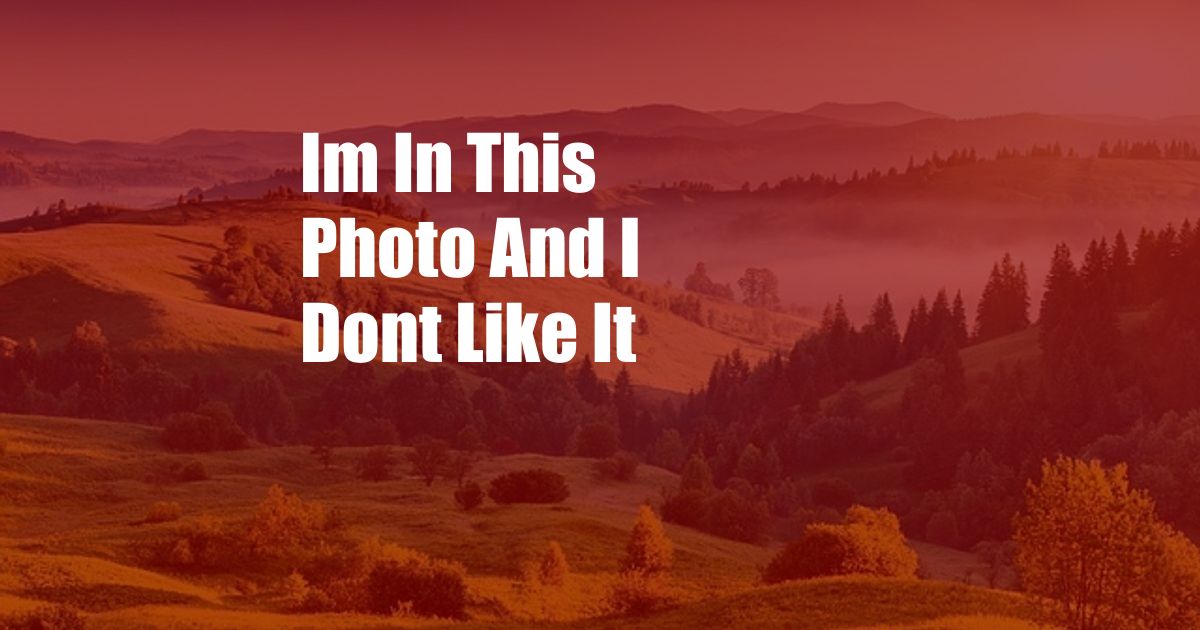
**”I’m in This Photo and I Don’t Like It!” Unwanted Online Images and Your Right to Privacy**
Have you ever stumbled upon an image of yourself online that makes you cringe? An unflattering social media profile picture, a candid shot taken at an unflattering angle, or perhaps even an embarrassing or private image shared without your consent. In today’s digital age, it’s a growing issue, and it raises important questions about our right to privacy and control over our online image.
Unwanted online images not only can damage our reputation or self-esteem but can also pose serious risks, such as identity theft or online harassment. It’s crucial to understand our rights and options for addressing these privacy violations.
**The Legal Landscape:**
In many jurisdictions, there are laws in place to protect individuals from unwanted online images. These laws vary depending on the country or region, but they generally fall into two main categories:
- Privacy laws: These laws protect individuals from the unauthorized collection, use, or disclosure of personal information, including images.
- Image copyright laws: These laws give creators of images certain rights over their work, including the right to prevent others from unauthorized use or distribution.
Understanding these laws is essential for determining your rights and pursuing remedies against unwanted online images.
**Taking Action:**
If you discover an unwanted online image, several steps can be taken to address the issue:
- Contact the platform: The first step should be to contact the website or platform where the image is hosted. Most platforms have policies and procedures for dealing with copyright infringement or privacy violations. Report the image and provide any relevant evidence or documentation.
- Contact the image owner: If you know who posted the image, consider reaching out to them directly. Explain your concerns and request that they remove the image. Be polite and respectful, even if the other party is uncooperative.
- File a DMCA takedown notice: If the image is protected by copyright, you can file a Digital Millennium Copyright Act (DMCA) takedown notice. This is a legal request for the removal of infringing material from a website.
- Consider legal action: In some cases, legal action may be necessary to protect your rights. This could involve filing a lawsuit for privacy violation, copyright infringement, or other applicable claims.
It’s important to note that these steps may not always be successful. However, they provide a framework for addressing unwanted online images and asserting your right to privacy.
**Prevention and Self-Protection:**
While it’s impossible to prevent all unwanted online images from surfacing, there are steps you can take to minimize the risk:
- Be mindful of your online presence: Think carefully before posting or sharing any images of yourself online. Consider who might see these images and how they could be used or misused.
- Use privacy settings: Many social media platforms and websites allow you to control who can see your posts and images. Use these settings to limit access to only trusted individuals.
- Monitor your online reputation: Regularly search for your name and images online to identify any unauthorized or unwanted content. Take prompt action to address any issues.
By following these tips, you can help protect your privacy and minimize the risk of unwanted online images.
FAQ on Unwanted Online Images
- Q: What are my rights regarding unwanted online images?
A: Your rights vary depending on the jurisdiction, but generally, privacy laws and copyright laws protect you against unauthorized use or disclosure of your image.
- Q: How can I remove unwanted online images?
A: Contact the platform where the image is hosted, report to the image owner, file a DMCA takedown notice, or consider legal action.
- Q: What should I do if someone posts an embarrassing or private image of me without my consent?
A: Report the image to the platform, contact the image owner, consider legal action, and document all communication related to the incident.
- Q: How can I prevent unwanted online images?
A: Be mindful of your online presence, use privacy settings, and monitor your online reputation to proactively address any unauthorized or unwanted content.
**Conclusion**
Unwanted online images can be a significant invasion of privacy and can have lasting consequences. By understanding our rights, taking action to address these violations, and practicing self-protection measures, we can safeguard our online image and protect our right to privacy in the digital age.
Are you concerned about unwanted online images? Share your experiences or questions in the comments below.